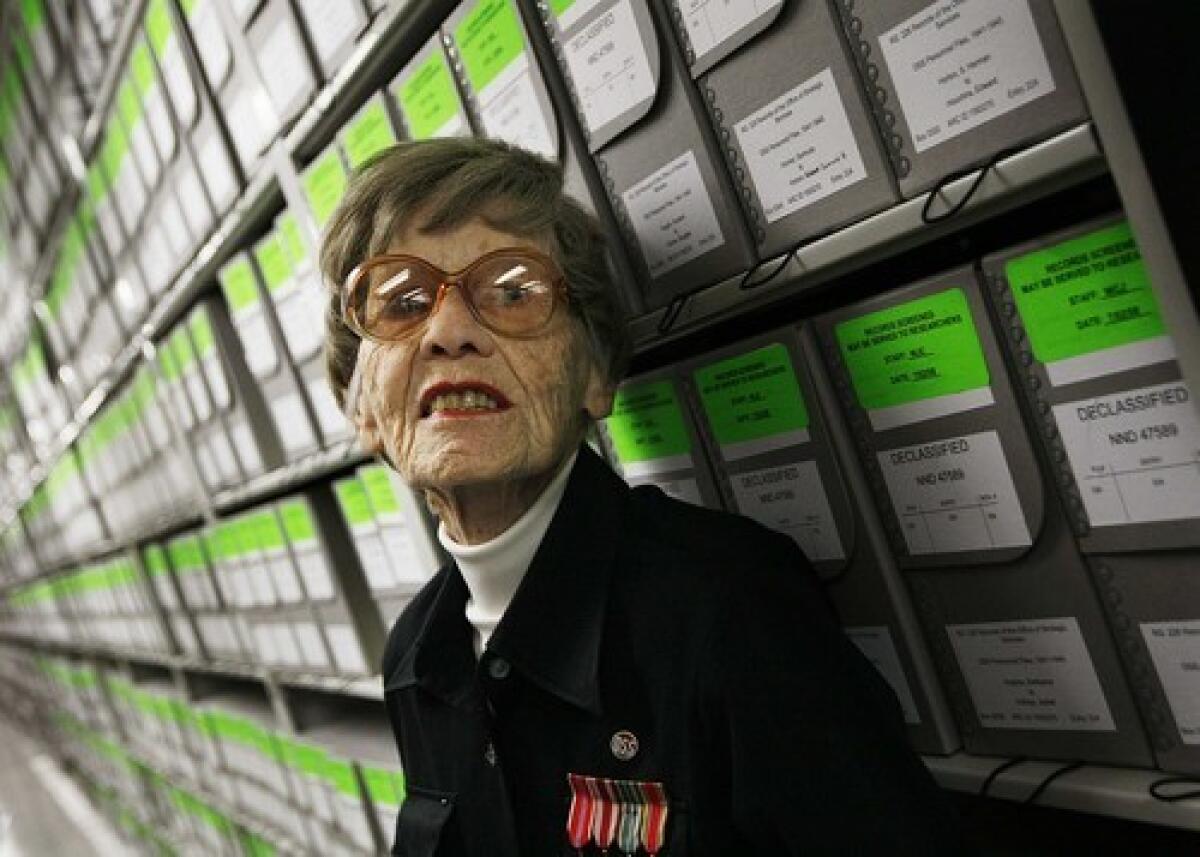Barbara Lauwers Podoski dies at 95; launched psychological campaign against Germans in WWII

- Share via
Barbara Lauwers Podoski, who launched one of the most successful psychological campaigns of World War II, which resulted in the surrender of more than 600 Czechoslovakian soldiers fighting for the Germans, died of cardiovascular disease Aug. 16 at the Veterans Affairs hospital in Washington, D.C. She was 95.
One of the few female operatives in the Office of Strategic Services, the wartime predecessor to the CIA, she found creative ways to undermine German morale.
Much of her work remained secret until last year, when her OSS personnel records were declassified.
The multilingual Barbara Lauwers, as she was then known, primarily interrogated prisoners of war from her base in Rome. An antagonistic Nazi sergeant under her questioning in 1944 mentioned that Czechs and Slovaks were used to doing the Germans’ “dirty work” along the Italian front.
Lauwers, a private, realized there was an opportunity to flip the loyalties of her former countrymen. She quickly borrowed the Vatican’s Czech and Slovak typewriters and prepared leaflets in both Czech and Slovak languages that urged the conscripts to change sides, telling them that they were being used.
“Shed this German yoke of shame, cross over to the partisans,” she implored them.
Within a week, many Czech and Slovak soldiers who had been working for the Germans crossed the Allied lines and surrendered. At least 600 had her leaflet in their pockets.
The pamphlets she wrote were distributed by other German POWs being held in and near Italy whom she helped select and train during Operation Sauerkraut, which sent them behind German lines to litter the countryside with propaganda claiming that the attempt on Adolf Hitler’s life in July 1944 sparked a rebellion in the army.
She was born Bozena Hauserova in Brno, then part of Moravia and Bohemia and which became part of Czechoslovakia in 1918. She studied at the University of Paris and received a law degree from Masaryk University in her hometown. She married an American, Charles Lauwers, when the Germans annexed her country in 1938 and moved to the Belgian Congo with him to work for the Bata shoe company.
Two years later, she immigrated to New York. After her husband was drafted in late 1941, she moved to Washington and went to work at the Czechoslovak legation in the press section, where she ghost-wrote two books for Czech colonels stationed there.
She joined the Women’s Army Corps on June 1, 1943. As a fluent speaker of English, German, Czech, Slovak and French, she was selected after basic training for the new OSS and sent to Washington.
By the start of 1944, she was sent to North Africa, and from there to Rome. Her decorations included the Bronze Star.
She and her first husband had divorced during the war. After Lauwers returned to the United States, she was involved in broadcasting for the Voice of America and worked at the National Academy of Sciences in Washington.
She eventually joined the Library of Congress as a research analyst, where she worked for 20 years before retiring in 1968. She returned to Austria for a visit in retirement and stayed there nine years, assisting in the Vienna office of an international refugee organization.
She moved back to Washington in 1977. Her second husband, Joseph Junosza Podoski, to whom she was married for 30 years, died in 1984. A companion, J.R. Coolidge, died in 1999.
Survivors include a daughter from another relationship, Marina Lee Bragg, and a granddaughter.
Sullivan writes for the Washington Post.
More to Read
Start your day right
Sign up for Essential California for the L.A. Times biggest news, features and recommendations in your inbox six days a week.
You may occasionally receive promotional content from the Los Angeles Times.





